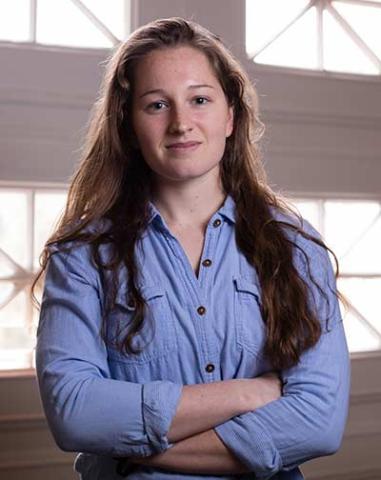
To understand Dakota Foster ’18’s path to becoming a Marshall Scholar, you have to go back to the Civil War.
Or at least to a Civil War battle reenactment, held on an elementary school soccer field in Brunswick, Maine, in 2005. Foster—or, as she was known that day, Gen. Ulysses S. Grant—was a fifth grader at the time, and a class lesson on the Civil War, culminating in a schoolyard battle, sparked a brewing interest in politics, war and public service.
“I’ve known since I was really young that I wanted to do public service,” she says. “It's been a process over the last 10 years of figuring out where I think that public service path is going to take me.”
Foster is now among 43 U.S. students awarded a 2018 Marshall Scholarship. Only one other small liberal arts college, Vassar College, has a Marshall Scholar for 2018.
Founded in 1953 and named in honor of former U.S. Secretary of State George C. Marshall, the Marshall Scholarships fund one or two years of graduate study for American students at one or more British universities. Scholars are selected from a field of about 1,000 applicants annually.
Over the past 15 years Amherst has had five Marshall Scholars, most recently Conor Clarke ’08 in 2009.
As a Marshall Scholar, Foster will first pursue a master's degree in war studies at King’s College London. For the second year, she will study international relations at either Cambridge University or the London School of Economics.
A double major at Amherst in political science and Asian languages and civilization, Foster plans to pursue a career in national security. She hopes to eventually work for the U.S. State Department, Department of Defense or National Security Council. Her dream job: to serve as national security adviser.
Foster grew up in Brunswick—a college town that was home for many years to a naval air station—feeling the importance of service. She says the wars in Iraq and Afghanistan influenced her academic interests, leading her to ask: “Why are we fighting? How? Against whom?”
“Ours is no longer a world of one-dimensional threats,” she wrote in her application. “We increasingly live in a multi-threat world, including the rise of non-state actors, the return of foreign fighters, climate change, and the growth of cyber warfare. It will become more and more difficult to combat these threats independently; instead, the leaders of tomorrow must be able to think globally, approach problems multilaterally, and possess the insight to evaluate these complex issues from multiple perspectives.”
At Amherst she has focused her studies on national security and the Middle East. Her favorite courses have included “Transparency & Secrecy,” “Nuclear Security,” and language courses in Arabic, including a semester last fall at the University of Jordan.
Last summer Foster conducted research and analysis as an intern at the U.S. Army’s Combating Terrorism Center in West Point, N.Y., where she helped conduct research and analysis. “Part of my work was looking at foreign fighters,” she says. “We had a lot of data from youth who were going to fight for ISIS in Iraq and Syria. [We were] analyzing that data, seeing what factors were driving these kids.”
She also studied the growth of al-Qaida in Pakistan and terror attacks on U.S. military bases. Foster spent previous summers interning with the U.S. House of Representatives’ Committee on Foreign Affairs (2016) and the Washington Institute for Near East Policy (2015).
At Amherst she was the only first-year student hired as a peer diversity educator in the Multicultural Resource Center, where she helped implement campus-wide programs. She has served as co-president of the Amherst Political Union, as a member of the College Discipline Committee, and as co-captain of women's lacrosse.